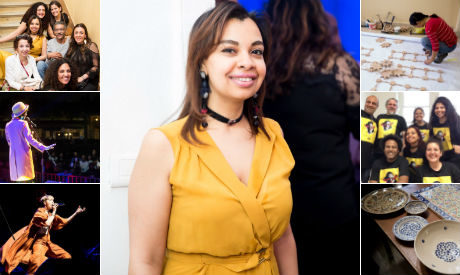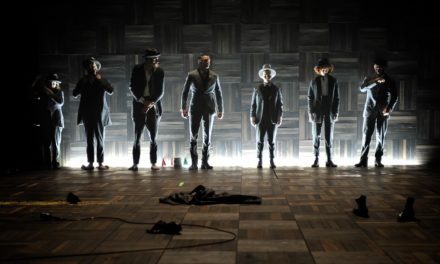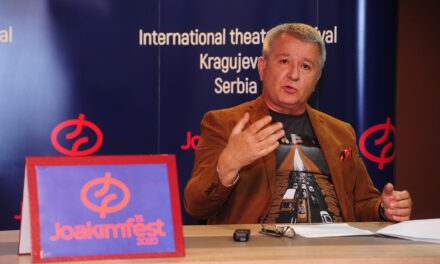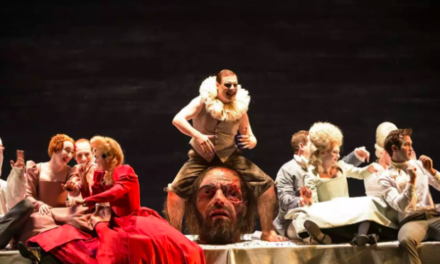A unique cultural player, Hamed’s work in the PR and marketing of the arts, helped launch, shed light on, or re-position many creative projects.
In Egypt, where the cultural sphere is as rich and varied as any in the world, the amount of work done by artists, cultural managers, and their supporters is enormous, but such enormous effort, time, dedication and finances are not always as obvious as one might hope. The amount of work done by art managers hugely exceeds the recognition they receive.
Artists and arts managers often ask themselves questions about insufficient visibility and impact, blaming the audience, “local culture” or any number of factors extraneous to their own work.
But the truth is that whatever the nature of a given creative project, as long as it carries good values and offers something interesting–whether new to the audience or already known–there are always ways to bolster up its impact through marketing and public relations.
Of course, this is not as simple as it sounds. The equations governing the arts and how PR and marketing work within them is immensely complicated. Few cultural managers are aware of the whole puzzle of which they are a small part, a fact painfully clear once their relative failures are taken into account. But however complicated the situation, solutions are always possible.
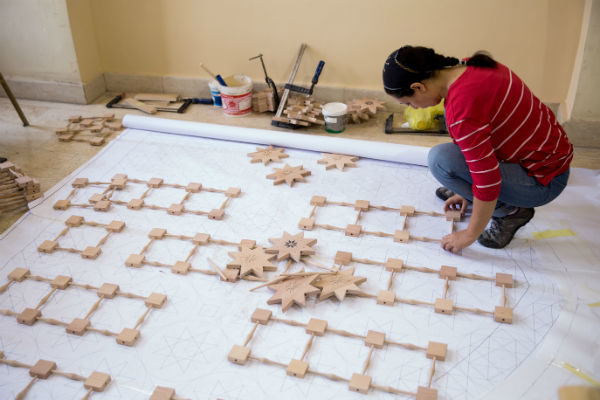
A second-year student at Jameel House of Traditional Arts, Cairo, working on her graduation project (Photo: Mostafa Abdel Aty)
“It is not magic,” Basma Hamed states, referring to the factors she tackles through her PR and marketing work for creative endeavours.
Her modest disposition conceals a firm self-confidence which, coupled with eloquence and a broad smile, is charming. At first, Hamed seems like one of the few hundred young people on the cultural scene with an articulate sense of her surroundings and a passion for art. But once you examine the activities and projects she carries on her shoulders, it is immediately obvious she is one of a handful. And once you consider her efficiency organizational skills, understanding of the arts field and people in it, among other rare qualities required of a person who mediates art, marketing, and PR, Basma Hamed’s achievement begins to look astonishing.
In fact it is thanks to her along with a few others that projects handled by the Orient Productions company–including the Downtown Contemporary Arts Festival (D-CAF), the Panorama of the European Film managed by Zawya art house cinema and the Jameel House of Traditional Arts which operates in Cairo’s Fustat area and is part of Art Jameel, a reputable organization working across several countries–have come into existence. Hamed is also involved in many smaller and quieter projects, and she supports artists in many ways, often without her name ever appearing anywhere.
Hamed’s involvement in the arts is rooted in a few fundamental elements: her natural passion for the field, her education in mass communication (she holds a bachelor’s from the Masr University for Science and Technology, majoring in Broadcasting Radio and TV) and her self-development in the PR and marketing strategies that she implements on the ground.
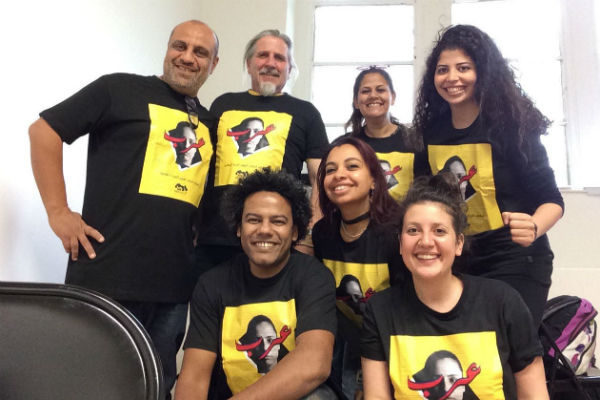
Basma Hamed (center) with the AAF team in Edinburgh Fringe Festival.
We meet at an open-air café to enjoy the warm sun balancing out the cool February breeze. A truly amiable human being, Hamed’s story is worth studying…
“I was exposed to arts and culture since I was a child. My parents are not artists, yet they always supported my interests. My dad was always busy working but he would take me and my siblings to the theatre to see children’s plays and to the Cairo International Children’s Film Festival; he would drop us off before the show started and come back once it was finished. As I grew up I started attending theatre and opera by myself or with friends.”
She then recalls her first artistic participation in the children choir operating under the Cairo Opera House, a path that she continues to pursue, taking professional singing lessons and working to master her soprano.
“I love opera and practicing singing is to me like a meditation session. I attend the lessons given by the opera’s Talents Development Centre, where I explore mainly the Italian arias.”
Stressing the performing arts as she does, Hamed has another creative passion: jewelry making.
“I started making jewelry as a little girl. At first, they were necklaces made of round pasta that I colored,” she laughs at the memory before adding that, taking notice of these attempts, her mother decided to support her with better materials.
“I am lucky that my parents always encouraged my artistic endeavors. In fact, I gave a few exhibitions of jewelry craft. In parallel, I continued with singing and occasional stage appearances. All this brought me closer to the field and helped me understand its dynamics.”
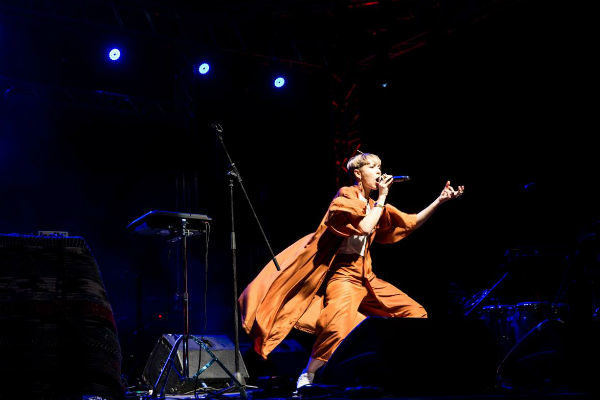
D-CAF 2018 opening concert at Al Azhar park, Cairo (Photo: Mostafa Abdel Aty)
On graduating Hamed worked as an assistant producer, production coordinator, assistant director as well as the PR officer at the Pyramedia for Media Production at Dubai TV, then as an executive producer at the Beeaty T.V. channel, which allowed her to look at the arts field from the viewpoint of the media.
“I believe this is when I developed an understanding of how media works, and today my PR job is based in large part on this knowledge. One day I saw an announcement stating that the Downtown Contemporary Arts Festival (D-CAF) was looking for young people interested in working at the press office. By January 2013 I was on board preparing for the D-CAF’s second edition. I was very lucky to have two mentors in D-CAF, two highly professional consultants who were in charge of the festival’s PR in its first round. They directed me throughout the festival’s second edition while at the same giving me a lot of responsibilities.”
In 2015, Hamed was promoted to Marketing & PR Manager of D-CAF, while her work continued to draw attention from the media and by extension the public and supporters to the growing festival.
“D-CAF has been a great challenge, at least at the beginning it was. We are talking about contemporary art, which even if it is a fascinating field, remains unknown to Egypt’s general public. The PR work involves, for example, educating the press about the importance of this art so we gain their trust and attention.”
Hamed started working like the most meticulous engineer, building the PR structure–including planning, timeline, reports, comparing income and outcome, etc–in the belief that this professional approach would pay back in the long run.
“You cannot expect immediate results. Public relations is about building a network, consistency, understanding the language of your messages’ recipients, learning from experience and benefiting from growth.”
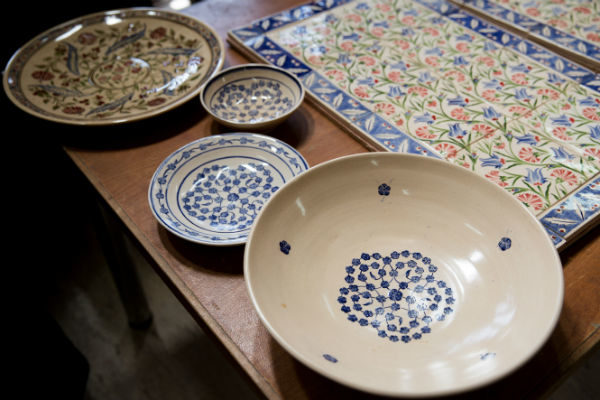
Ceramics work by Jameel House of Traditional Arts students (Photo: Mostafa Abdel Aty)
While expanding her network and skills, Hamed also became responsible for other projects handled by Orient Productions, such as marketing and PR for the Arab Arts Focus showcase at the Edinburgh Fringe Festival (2017).
“PR differs from one country to another and the patterns of some cultures or countries can never be copied in another. Copying a set of rules that prove successful in one part of the world to another will not bring the expected results in the target location. It’s a matter of different dynamics, even if many elements of the work itself are similar.
We need to speak the language of the people we are addressing or we are simply leaking energy and minimising impact. In the Arab Arts Focus, and for local impact, I worked in cooperation with the local PR agency. The press release work was not the same, the approach was different, simply because the culture of the whole job was different. Adapting is necessary.”
Soon other institutions were asking Hamed for her services. This is how she became involved with the Panorama of the European Film (2014) and the Jameel House of Traditional Arts (2016-date). D-CAF, Zawya, and Jameel House work in completely different parts of the cultural scene and target different audiences yet as Hamed says, “it is all about using the correct tools,” while she remains professional in making sure each of her “clients” benefits from her services.
“Moving in between different art sectors is also an opportunity for me to learn more about them and expand my network. I also wanted to understand how different people, artists, and managers operate.”
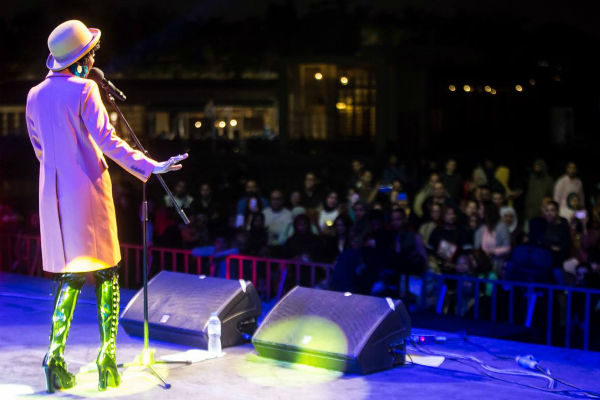
A performance during D-CAF (Photo: Mostafa Abdel Aty)
No need to add that at the end of the day, the art scene benefits from Hamed’s cumulative experience. She only hopes that PR and marketing players will utilize their knowledge in the creative scene and that artists and artistic bodies will make clear distinctions between different communication sectors. This, as she explains, will help arts management bring better impact and visibility to the arts.
“Inside the arts field, there is a lot of confusion when it comes to terms such as marketing and public relations. Contrary to the belief of many arts managers, they are not interchangeable. Each job has distinctive characteristics while one complements the other. Public relations is about the public, it’s publicity and the network created that generates the organic interest of the public and media which then gives credibility and makes an impact on the audience. Marketing reaches the audience and creates buzz differently. It can raise awareness through different tools such as investing in printed material for instance but it cannot function as a replacement for PR though in some companies the PR also does marketing tasks. The bottom line is that both complement one another and must function along parallel lines,” Hamed explains, adding that a clear distinction between the two is more apparent on the international arts management scene and proves successful in bringing the expected results.
“Putting everything into one melting pot wakens the project’s visibility and impact. There are so many valuable artistic projects in Egypt yet many of them suffer from poor visibility. If you look closer at their operational aspect, you will find the same confusion, time and again–among other elements of course.”
Hamed also points to media which still needs to do the arts justice. Yet, it is also in the hands of arts managers to work professionally, create media strategies, expand networks, educate media and public, so that, in return, interest is generated and partners are drawn into cooperation. In this as in other respects, Hamed’s efforts are truly commendable, though it is all a result of her personal interests and as such continues to evolve.
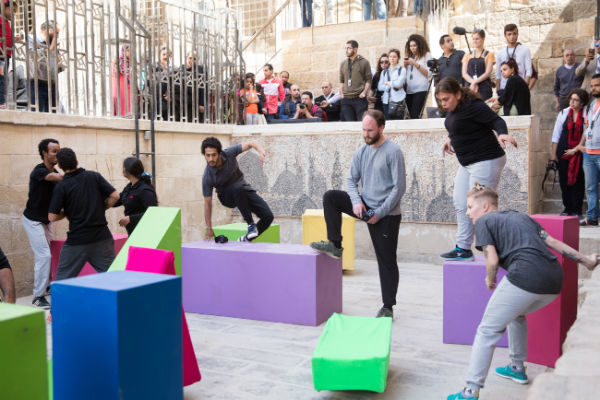
Blocks performance as part of the D-CAF 7th edition, at Maq’ad Sultan Qaitbey (Photo: Mostafa Abdel Aty)
“Recently I took a different turn. I work part time for D-CAF now, part time for the Jameel House, and I take several freelance jobs that I can handle.”
Sometimes she relies on the support of other people who operate under her supervision, at other times she cooperates within a network.
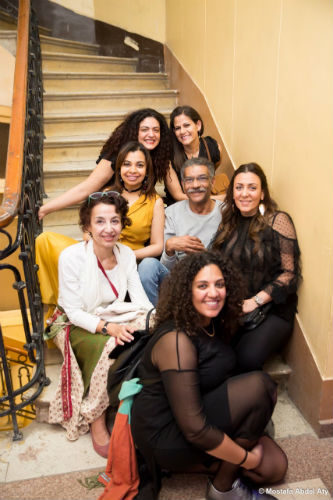
Basma Hamed (in the yellow dress) with the team at D-CAF VIP opening at the old French Consulate (Photo: Mostafa Abdel Aty)
Hamed says she would love to be more present in the performing and stage arts. Her eyes twinkle as she thinks about jewelry making, a passion that has suffered from lack of time for a few years, though during that time Hamed did make a few objects just for herself.
“I need time for myself. I want to travel. The PR and marketing jobs, the workshops that I took here and there, took me to the different parts of the world–perks of the job. I also made a lot of friends. Now I’d love to have more time for my personal travels,” she smiles.
Over the past decade and a half, Basma Hamed has given the arts and cultural scene much. As she continues her work in PR and marketing of the arts, her practice has already launched, shed light on or repositioned many creative projects. She also has many artist friends who benefited from the skills and the knowledge that she generously offers them. The accumulated understanding of the field and culture, the expertise developed, the passion for arts and willingness to learn will continue taking Hamed on great journeys.
Those who are yet to cross paths with her, will definitely be drawn to her character, dedication and passion, personal, and professional generosity. In this context, Basma Hamed is a unique cultural player in a country where many challenges face artistic endeavor, which she approaches with an ever growing arsenal of solutions.
* A version of this article appears in print in the February 14, 2019 edition of Al-Ahram Weekly under the headline: Art partisan.
This article appeared in Ahram Online on February 14, 2019, and has been reposted with permission.
This post was written by the author in their personal capacity.The opinions expressed in this article are the author’s own and do not reflect the view of The Theatre Times, their staff or collaborators.
This post was written by Ati Metwaly.
The views expressed here belong to the author and do not necessarily reflect our views and opinions.

